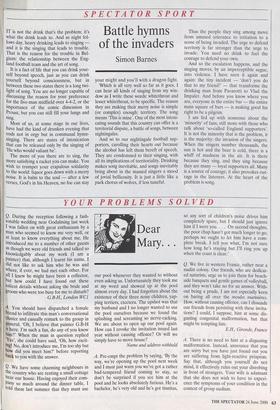SPECTATOR SPORT
Battle hymns of the invaders
Simon Barnes
IT is not the drink that's the problem; it's what the drink leads to. And as night fol- lows day, heavy drinking leads to singing and it is the singing that leads to trouble. That is the reason for the trouble in Bel- gium: the relationship between the Eng- land football team and the art of song.
It is a fact of life that you can drink your- self beyond speech, just as you can drink yourself beyond consciousness, but in between these two states there is a long twi- light of song. You are no longer capable of discussing the reason for your preference for the five-man midfield over 4-4-2, or the importance of the comic dimension in Proust, but you can still fill your lungs and sing.
Most of us, at some stage in our lives, have had the kind of drunken evening that ends not in orgy but in communal hymn- singing. There are states of intoxication that can be released only by the singing of `He who would valiant be'.
The more of you there are to sing, the more satisfying a racket you can make. You wish to trumpet your crapulous solidarity to the world: liquor goes down with a merry noise. It is balm to the soul — after a few verses, God's in his Heaven, no foe can stay your might and you'll with a dragon fight.
Which is all very well so far as it goes. I can hear all kinds of singing from my win- dow as I write these words: whitethroat and lesser whitethroat, to be specific. The reason they are making their merry noise is simple (or complex) enough: territory. The song means 'This is mine'. One of the most intoxi- cating sounds that this country can offer is a territorial dispute, a battle of songs, between nightingales.
And so to our nightingale football sup- porters, carolling their hearts out because the alcohol has left them bereft of speech. They are condemned to their singing, with all its implications of territoriality. Drinking makes song inevitable, and songs inevitably bring about in the massed singers a mood of jovial bellicosity. It is just a little like a pack chorus of wolves, if less tuneful. Thus the people they sing among move from amused tolerance to irritation to a sense of being invaded. The urge to defend territory is far stronger than the urge to invade. You need no drink to fuel the courage to defend your own.
And so the escalation happens, and the singing moves, by an imperceptible segue, into violence. I have seen it again and again: the tiny incident — 'don't you do that to my friend!' — that transforms the drinking man from Pavarotti to Vlad the Impaler. And before you know where you are, everyone in the entire bar — the entire main square of bars — is making good his right to be a pilgrim.
I am fed up with nonsense about the `minority' of fans, still more with those who talk about 'so-called England supporters'. It is not the minority that is the problem, it is the majority: the invasion of the singers. When the singers number thousands, the sun is hot and the beer is cold, there is a whiff of madness in the air. It is there because they sing, and they sing because they are many — loyal supporters all. Many is a source of courage; it also provokes out- rage in the listeners. At the heart of the problem is song.


































































 Previous page
Previous page